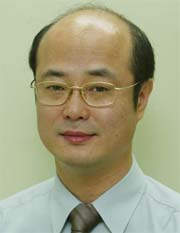 |
By Seong Han-yong
Senoir Political Reporter
A lot of voters in the regional elections held May 31 did what they call "ask-no-questions" (mut-ji-ma) voting. They did so because they wanted to issue judgment on Roh Moo-hyun’s administration. Many unqualified candidates won as a result, just for belonging to the Grand National Party (GNP), which is rapidly becoming a potential "alternative" for Korean politics.
Now that those elections are over, everyone’s interest has turned to next year’s presidential election. People want to know whether the GNP will be able to win. All said, it surely could. In the politics of developed nations, conservatives and progressives take turns governing. Having a conservative party take power is a good thing. However, when it comes to the GNP taking over the government, there are certain conditions that it will have to satisfy. Some will be easy and some will be hard.
Let us begin with the "easy" conditions. Last month, GNP Assemblywoman Chun Yu-ok organized a seminar at the National Assembly office building. The sign outside said "Ten Years Lost: Will the GNP’s Dream Come True?" Given the mood around the country, the room was packed.
At the conference, Mok Jin-hyu of Kookmin University said, "Maybe the GNP lost something, but the people did not." He noted that the GNP’s image portrays it as representing the old establishment, corruption, and the rich. He also said it needs to bring in new people and carry out internal reforms. Assembly member Hong Joon-pyo said the party will be unable to win if it fails stay ahead of the times with new ideas. In summary, they talked about how the GNP is not going to win the presidency exclusively because of distaste for the current government, and how it instead needs to give the country vision and be reborn as a rational conservative party. The solution will be easier to carry out than to talk about. The "difficult" conditions belong to the realm of the nonpolitical, and so are far more complex. For starters, there is the issue of regional prejudice. Some of the people from the Yeongnam region (the Gyeongsang provinces) who held power in past administrations, hold elitist feelings of "Yeongnam supremacy." The GNP has some of that regional elitism, and it needs to get rid of it. Part of the reason the alliance of Kim Dae-jung and Kim Jong-pil worked in the 1997 presidential election was because of a negative reaction to decades of rule by Yeongnam candidates, shared by voters in the greater capital region and the central region. Men in power from Yeongnam thought less of persons from "other areas," and they had particular contempt for people from the Honam region (the Jeolla provinces). Quite a lot of people from "other areas" are scared of having the "mainstreamers" from Yeongnam back in power again. The regional issue in and of itself presents an obstacle for the GNP winning back the presidency. The GNP is the grandchild of the Democratic Justice Party, which was the government that dyed the city of Gwangju in blood. Chairwoman Park Geun-hye is the daughter of former president Park Chung-hee, who ruled with an iron fist for 18 years. These are facts that will not change, no matter how they’re packaged. One wants to see how the GNP will pay for all that karma. The GNP has a lot of what they call "old establishment hard-liners." The man who drafted Park Chung-hee’s Yusin Constitution is the head of the Yeouido Research Center, the GNP’s main think tank. The party's membership includes men who were once prosecutors of "public security crimes," and none of the other parties have anyone similar. There are people who are blindly pro-U.S. and people who are actively calling for North Korea’s collapse. Maybe the reason the GNP looks like it lacks ideas about how to come up with money for welfare is not simply because it is the opposition, but because it just doesn’t care about the social security net. Will it be able to legally "eliminate" the extreme right elements within the party? Maybe the extreme right is what’s really manipulating the GNP. You can cut off a person’s limbs, but if you cut away at his body you could kill him. Park Geun-hye did not clap with joy while she watched the votes being counted last week. She looked humble, and said, "Popular sentiment is to be feared." However, some GNP Assembly members were so overjoyed they went home and drank pok tan ju, that mix of beer and soju. "Just wait until we win," say people in the GNP these days. "We're going to take it all." Am I becoming too wary already?





